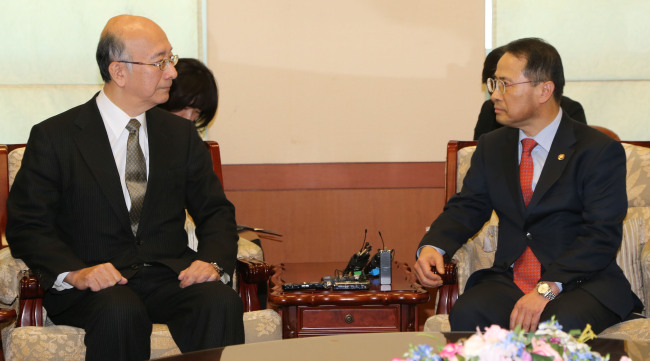Japan’s school guidelines lay claim to Dokdo
Seoul summons Japanese ambassador, calls for cancellation of revision
By Korea HeraldPublished : Jan. 28, 2014 - 20:07

Tokyo on Tuesday announced a revision to the state teaching guidelines for middle- and high-school textbooks to step up its claim to South Korea’s easternmost islets of Dokdo, further aggravating its diplomatic friction with Seoul.
Under the revision, Japan’s claim to Dokdo and a chain of disputed islands in the East China Sea, also claimed by China, is to be spelled out in school textbooks for history, geography and social studies.
“It is only natural for a state to accurately teach about its ‘inherent’ territory,” Japan’s Education Minister Hakubun Shimomura told reporters.
Seoul’s Foreign Ministry upbraided Tokyo for attempting to teach “false history” to young students, underscoring that the revision was a clear manifestation of Japan’s lingering nostalgia for its imperialist past.
To further ratchet up pressure on Tokyo to face up to its wartime history, the ministry decided to push for joint research with the countries that suffered from Japan’s past militarism.
Later in the day, the ministry called in Japan’s Ambassador to South Korea Koro Bessho to strongly protest the revision of the guidelines.
“While Japan is once again making preposterous claims to Dokdo, which is part of Korea’s inherent territory historically, geographically and by international law, it is attempting to teach these false claims to its youth,” said the ministry in a statement issued under the name of its spokesperson Cho Tai-young.
“Our government strongly condemns it and calls for an immediate cancellation (of the revision). Should Tokyo not respond to our calls, our government would take stern measures accordingly.”
The ministry also cast doubts over Tokyo’s mantra of “active pacifism,” noting that Japan’s lack of efforts to enhance the frayed ties with the neighboring states has threatened regional peace and stability.
“Japan’s deceptive attitude once again brings to the fore its real facade, which has been hidden under Tokyo’s mantra of the so-called active pacifism,” the statement said.
“When it relentlessly causes conflicts with neighboring states, we cannot help but ask Japan how it could possibly contribute to peace and stability for the international community.”
Japan’s moves to rewrite the textbook guidelines came as its relations with Korea headed toward one of their lowest ebbs due to Japanese politicians’ failure to fully atone for its wartime misdeeds.
Last December, Japan’s hawkish Prime Minister Shinzo Abe visited the controversial Yasukuni Shrine despite strong international criticism. The shrine in Tokyo honors Japanese war dead including 14 Class-A World War II criminals.
Tokyo also called South Korean independence fighter Ahn Jung-geun a “terrorist,” further fueling anti-Japanese sentiment in Korea. Ahn shot to death Japan’s first Prime Minister Hirobumi Ito in Harbin, China, in 1909 as part of his anti-colonization campaign.
“Prime Minister Abe’s visit to the shrine has already crossed the line. But Japan is not making any efforts at all to defuse the conflicts (with Seoul). Having said that, the government cannot help but deal sternly with the Japanese moves,” a Seoul official said, declining to be named.
A series of events in the coming months are also expected to further worsen Korea-Japan relations.
In February, the Japanese prefecture of Shimane is to observe its Takeshima (Dokdo in Japanese) Day to assert the country’s claim to Dokdo. The Abe government sent senior officials to attend the commemorative ceremony last year.
Tokyo is also to issue its diplomatic and defense policy documents in April and July, respectively, to reiterate its claim to Dokdo. Last year, Japan even posted a video clip to advertise its claim to the islets, further enraging Koreans.
By Song Sang-ho (sshluck@heraldcorp.com)
-
Articles by Korea Herald






![[From the Scene] Monks, Buddhists hail return of remains of Buddhas](http://res.heraldm.com/phpwas/restmb_idxmake.php?idx=644&simg=/content/image/2024/04/19/20240419050617_0.jpg&u=20240419175937)








![[From the Scene] Monks, Buddhists hail return of remains of Buddhas](http://res.heraldm.com/phpwas/restmb_idxmake.php?idx=652&simg=/content/image/2024/04/19/20240419050617_0.jpg&u=20240419175937)

![[KH Explains] Hyundai's full hybrid edge to pay off amid slow transition to pure EVs](http://res.heraldm.com/phpwas/restmb_idxmake.php?idx=652&simg=/content/image/2024/04/18/20240418050645_0.jpg&u=20240419100350)

![[Today’s K-pop] Illit drops debut single remix](http://res.heraldm.com/phpwas/restmb_idxmake.php?idx=642&simg=/content/image/2024/04/19/20240419050612_0.jpg&u=)